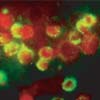 Cultivation and serological characterization of a human Theilers like cardiovirus
Cultivation and serological characterization of a human Theilers like cardiovirusChiu CY, Greninger AL, Chen EC, Haggerty TD, Parsonnet J, Delwart E, Derisi JL, Ganem D.
J Virol. 2010Abstract: Cardioviruses (e.g., Theiler's murine encephalomyelitis virus [TMEV]) are members of the Picornaviridae family that cause myocarditis and encephalitis in rodents. Recently, several studies have identified human cardioviruses, including Saffold virus (SAFV) and a related virus named human TMEV-like cardiovirus (HTCV). At least eight cardiovirus genotypes are now recognized, with SAFV and most strains of HTCV belonging to genotypes 1 and 2, respectively; genotype 2 strains are the most common in the population. Although a genotype 3 cardiovirus has recently been cultured (SAFV-3), the genotype 1 and 2 cardioviruses have been difficult to propagate in vitro, hindering efforts to understand their seroprevalence and pathogenicity. Here we present the isolation and characterization of a genotype 2 human cardiovirus (HTCV-UC6). Notably, successful cultivation of HTCV-UC6 from stool required the addition of cytokine-blocking antibodies to interrupt downstream antiviral pathways. Unlike SAFV-3, HTCV-UC6 exhibited slow replication kinetics and demonstrated only a moderate cytopathic effect. Serologic assays revealed that 91% of U.S. adults carry antibodies to the genotype 2 cardioviruses, of which 80% generate neutralizing antibodies, in agreement with previous data showing that cardiovirus infection is widespread in humans. We also demonstrate an acute cardiovirus seroconversion event in a child with diarrhea and vomiting, thus reporting for the first time evidence linking cardiovirus infection to diarrheal disease in humans.
